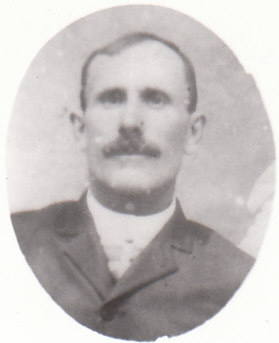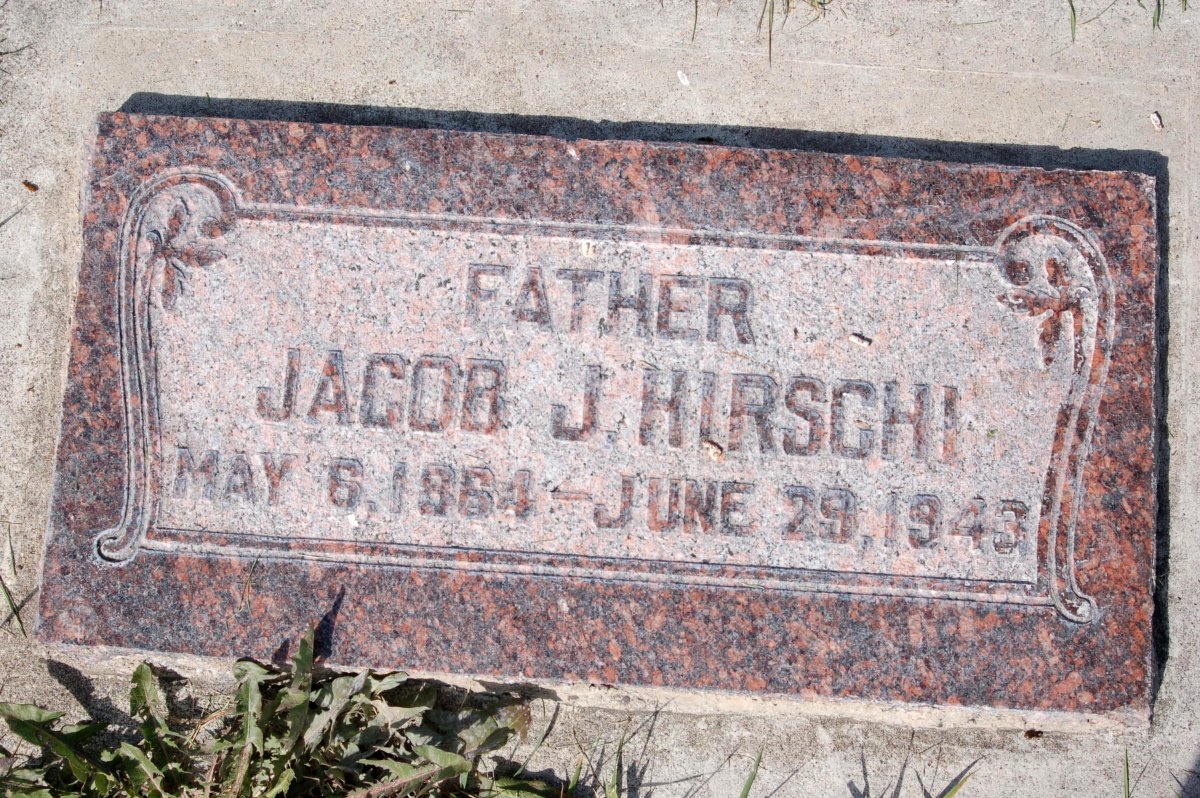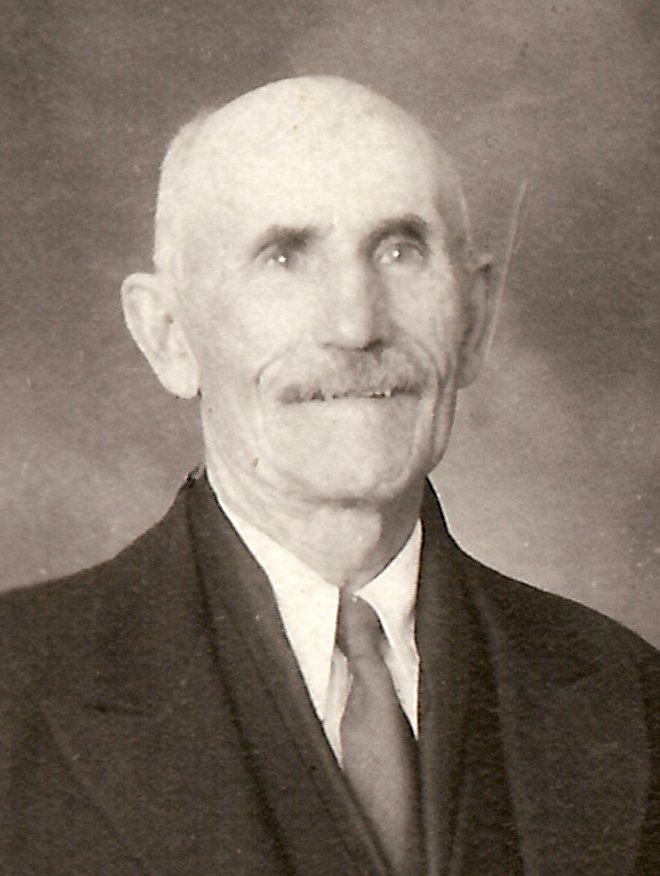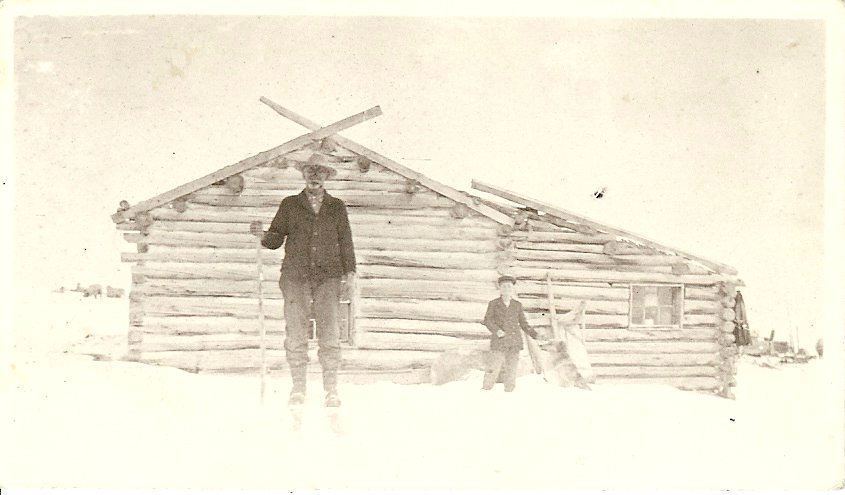In the winter he enjoyed reading, playing games, wood carving, and coasting down the hillside behind his home on their homemade sleighs. Jacob said, "Many times 2:00 A.M. would find us still gliding down the hills on our sleighs, yodeling our favorite Swiss songs." Later in Jacob's life he would sing these beautiful folk songs to his own children and it is said that he had a way with holding his notes until sometimes his children would wonder if he would be able to catch his breath. Surrounded by scenic splendor and always within few minutes journey into the mountains, he grew to love his country.
Jacob attended Swiss schools where he learned to read and write in the Swiss language and was noted for his beautiful handwriting. In the early spring of 1878 when he was thirteen years old (April 11), he was baptized into the Church of Jesus Christ of Latter Day Saints (Mormon). He was baptized along with his brothers David and Arnold Daniel. In the next few years the gospel was to split the Jakob Hirschi family and his mother and two sisters and three brothers would leave for America in 1882 and 1883. This was to leave his older sister, Lina, and himself with his father in Switzerland. Jacob was eighteen years old at the time his older sister Rose and younger brother David left for America. But because he was soon to be drafted into the Swiss Army to serve for three years, he was unable to follow with his mother and family until he completed his tour of military duty. Jacob was in Switzerland when his father divorced his mother and remarried. When he completed his army duty in 1885, he quickly made arrangements to leave to America and as far west as Salem, Ohio.
When he arrived in Salem, Ohio he was out of money and soon found work with a man named John Teuscher who owned a large dairy. He hired on and worked making Swiss cheese and helped with the milking. In a little over a year he again earned enough money to continue his migration to Montpelier, Idaho. In the late fall of 1887 he arrived in Montpelier and had a warm reunion with his mother and family.
Jacob was quickly put to work getting firewood out of Montpelier Canyon for his family. It is said that about this time he chanced to met his future wife, Rosina Knutti, when he stopped at the Knutti home to get John Knutti to help in getting firewood out. He soon found work with the Kunz Brother's Dairy at Bern, Idaho, called "Little Switzerland" as it was settled by all Swiss people. He again followed his learned trade. He milked, made cheese and it was said "whatever they needed done, he could do it."
Rosina Knutti (his wife) said, "One winter Jacob and another man were asked to feed the Kunz brother's dry cattle at little Blackfoot (now Wayan, Idaho) located many miles north of Soda Springs." Jacob explained--at one time during that winter the snow became so deep that he and his companion could not use their horses and sleighs to feed for many days, so they had to snowshoe out to the stock yards and feed grounds, taking with them a dried cowhide with ropes tied to it and then loaded the hay on it and pulled it out by hand to feed the cattle. Doing this and cutting the water holes open with an axe entailed lots of hard work and took most of the short winter days. For many days the temperature would stay at forty degrees below zero. Before spring broke, Jacob made a snowshoe trip to Soda Springs to buy more food. This took two days. When he arrived in Soda Springs he quickly bought the food, packed it on his back and snowshoed back to camp arriving late in the evening. His partner was glad to see him and they were happy for the safety of each other and Jacob said, "That was one of the hardest experiences for man and beast."
Jacob later went to Hams Fork and worked at logging; Hams Fork being located in and around what is now Cokeville, Wyoming.
One March 11, 1893 (Rosina Knutti's birthday) Jacob married Rosina (Rose) Knutti at Montpelier, Idaho. This marriage was later solemnized in the Logan Temple at Logan, Utah on October 30, 1901. Jacob and Rose moved to south Montpelier and purchased about 20 acres of farm ground. Here they built their winter home and continued to homestead the 640 acres at Sheep Creek which was later called Alton, Idaho. Jacob had started this homestead in 1891 and it soon became known as "The Ranch." Jacob became a naturalized citizen of the United States on July 21, 1894 and this then gave him the right to "prove up" on his homestead. Harry Hirschi (a son) said, "Before father took out his homestead in Alton, he and John Knutti took a trip to the Little Bighorn country to look over homestead property, but when he returned he could not convince Rose to move that far away from her family and so they settled on the Sheep Creek section."
Children were to bless Jake and Rose and on April 9, 1894 their first child was born. She was named Maude. Then on June 21, 1897 their second child, Edna, was born. Alfred was born on April 2, 1890. In 1902 Rose again was expecting a child when Jake's mother (Susanna Katherina Werren) passed away on July 2, 1902. Walter was born on July 6, 1902. Harry was born on March 4, 1906 and Edwin was born on October 12, 1909. Jakob Hirschi died the same year on July 18, 1909 and was buried in the Montpelier Cemetery. Marguerite was the last child to be born to this family. Her birth was recorded on May 11, 1912.
Between the responsibilities of rearing their seven children and clearing their homestead and building homes and barns, Jake and Rose were very busy. However, Jake loved to sing, and it was during this time that a group was started called the Swiss Yodelers. This group consisted of Jacob Hirschi, Chris Teuscher, Rudolf Widmer, Arnold Hirschi, Mary Ann Hirschi and others who filled in. They developed a fine reputation for singing and yodeling Swiss folk songs and were in great demand for many years. They sang in church LDS conferences, at parties, etc.
Jacob was a rancher by vocation. He sometimes ran as many as 500 sheep and 100 head of cattle at one time. This meant that his life was tied to his livestock, and in the winter this was especially true. During winter, Rose and the children lived on the property south of Montpelier and the children went to school. Jacob remained with his livestock on the ranch and came home on weekends. this meant that he was away from his family many months of the year living alone, which was a great sacrifice on his and Rose's part. He came into the lower home for supplies and for special events like Christmas and Thanksgiving. What a surprise it would be at Christmas time when he brought presents to the children of beautifully carved animals and other things crafted from his carving skill.
On October 31, 1914 Jake's oldest daughter Maude was married, just at the outbreak of the First World War. For the next four years the country was at war and Jake's oldest son was spared from the war due to his health. Finally the war ended in 1918 and peace returned to our nation. The foreign countries of Europe were reopened to missionary work.
In April 1920, Jake was called by Heber J. Grant, President of the Church of Jesus Christ of Latter Day Saints to serve a mission in Switzerland. This made him happy and with the help of his children, he left Rose knowing that the Lord would provide his support for this special calling. Arriving in Switzerland, he was assigned to the area very close to his birthplace. What a reunion to visit old friends and renew old acquaintances! He was located at Interlaken, very close to Bern and Zurich. He helped convert a Swiss family by the name of Albrecht, consisting of the mother and father and four sons.
Jacob stayed three years in this beautiful country. At this time he was sixty years old. He was asked to stay a little longer and help train new missionaries to speak the language. When he was released and home at Montpelier, he helped sponsor this newly converted Albrecht family by sending money so they could travel to America and to Montpelier, Idaho. When they arrived in Montpelier, he arranged for them to stay with his family until he could find work for them in Logan, Utah. For the next years, from 1925 until 1934, his other children were getting married and finally in 1934 Jacob and Rose were left alone.
Jake was semi-retired during the Great Depression of the 1930's and spent much time with friends and neighbors helping them. This period of time was used to fish and hunt and enjoy life, which, up until this time had been full of hardship and toil. He still worked a little and kept the Alton ranch going with limited number of livestock.
Marguerite states, "Father and Mother were always cheerful. They loved each other and showed respect to all. Above all, they loved their family. Their family was their prized possessions. They loved the gospel and taught by example rather than precept and were honest in all their dealings."
In the first part of the month of June 1943, Jake was harrowing the alfalfa at his ranch at Alton and was breaking a wild horse with his trained team when a bolt of lightning struck very close and spooked his team. He was drug by this runaway team and seriously injured. He was transported to Salt Lake City, Utah, were, after observation was released to his daughter Maude's home on June 29th. He passed away here at the age of seventy-nine. He was buried in Montpelier, Idaho Cemetery.
In the winter he enjoyed reading, playing games, wood carving, and coasting down the hillside behind his home on their homemade sleighs. Jacob said, "Many times 2:00 A.M. would find us still gliding down the hills on our sleighs, yodeling our favorite Swiss songs." Later in Jacob's life he would sing these beautiful folk songs to his own children and it is said that he had a way with holding his notes until sometimes his children would wonder if he would be able to catch his breath. Surrounded by scenic splendor and always within few minutes journey into the mountains, he grew to love his country.
Jacob attended Swiss schools where he learned to read and write in the Swiss language and was noted for his beautiful handwriting. In the early spring of 1878 when he was thirteen years old (April 11), he was baptized into the Church of Jesus Christ of Latter Day Saints (Mormon). He was baptized along with his brothers David and Arnold Daniel. In the next few years the gospel was to split the Jakob Hirschi family and his mother and two sisters and three brothers would leave for America in 1882 and 1883. This was to leave his older sister, Lina, and himself with his father in Switzerland. Jacob was eighteen years old at the time his older sister Rose and younger brother David left for America. But because he was soon to be drafted into the Swiss Army to serve for three years, he was unable to follow with his mother and family until he completed his tour of military duty. Jacob was in Switzerland when his father divorced his mother and remarried. When he completed his army duty in 1885, he quickly made arrangements to leave to America and as far west as Salem, Ohio.
When he arrived in Salem, Ohio he was out of money and soon found work with a man named John Teuscher who owned a large dairy. He hired on and worked making Swiss cheese and helped with the milking. In a little over a year he again earned enough money to continue his migration to Montpelier, Idaho. In the late fall of 1887 he arrived in Montpelier and had a warm reunion with his mother and family.
Jacob was quickly put to work getting firewood out of Montpelier Canyon for his family. It is said that about this time he chanced to met his future wife, Rosina Knutti, when he stopped at the Knutti home to get John Knutti to help in getting firewood out. He soon found work with the Kunz Brother's Dairy at Bern, Idaho, called "Little Switzerland" as it was settled by all Swiss people. He again followed his learned trade. He milked, made cheese and it was said "whatever they needed done, he could do it."
Rosina Knutti (his wife) said, "One winter Jacob and another man were asked to feed the Kunz brother's dry cattle at little Blackfoot (now Wayan, Idaho) located many miles north of Soda Springs." Jacob explained--at one time during that winter the snow became so deep that he and his companion could not use their horses and sleighs to feed for many days, so they had to snowshoe out to the stock yards and feed grounds, taking with them a dried cowhide with ropes tied to it and then loaded the hay on it and pulled it out by hand to feed the cattle. Doing this and cutting the water holes open with an axe entailed lots of hard work and took most of the short winter days. For many days the temperature would stay at forty degrees below zero. Before spring broke, Jacob made a snowshoe trip to Soda Springs to buy more food. This took two days. When he arrived in Soda Springs he quickly bought the food, packed it on his back and snowshoed back to camp arriving late in the evening. His partner was glad to see him and they were happy for the safety of each other and Jacob said, "That was one of the hardest experiences for man and beast."
Jacob later went to Hams Fork and worked at logging; Hams Fork being located in and around what is now Cokeville, Wyoming.
One March 11, 1893 (Rosina Knutti's birthday) Jacob married Rosina (Rose) Knutti at Montpelier, Idaho. This marriage was later solemnized in the Logan Temple at Logan, Utah on October 30, 1901. Jacob and Rose moved to south Montpelier and purchased about 20 acres of farm ground. Here they built their winter home and continued to homestead the 640 acres at Sheep Creek which was later called Alton, Idaho. Jacob had started this homestead in 1891 and it soon became known as "The Ranch." Jacob became a naturalized citizen of the United States on July 21, 1894 and this then gave him the right to "prove up" on his homestead. Harry Hirschi (a son) said, "Before father took out his homestead in Alton, he and John Knutti took a trip to the Little Bighorn country to look over homestead property, but when he returned he could not convince Rose to move that far away from her family and so they settled on the Sheep Creek section."
Children were to bless Jake and Rose and on April 9, 1894 their first child was born. She was named Maude. Then on June 21, 1897 their second child, Edna, was born. Alfred was born on April 2, 1890. In 1902 Rose again was expecting a child when Jake's mother (Susanna Katherina Werren) passed away on July 2, 1902. Walter was born on July 6, 1902. Harry was born on March 4, 1906 and Edwin was born on October 12, 1909. Jakob Hirschi died the same year on July 18, 1909 and was buried in the Montpelier Cemetery. Marguerite was the last child to be born to this family. Her birth was recorded on May 11, 1912.
Between the responsibilities of rearing their seven children and clearing their homestead and building homes and barns, Jake and Rose were very busy. However, Jake loved to sing, and it was during this time that a group was started called the Swiss Yodelers. This group consisted of Jacob Hirschi, Chris Teuscher, Rudolf Widmer, Arnold Hirschi, Mary Ann Hirschi and others who filled in. They developed a fine reputation for singing and yodeling Swiss folk songs and were in great demand for many years. They sang in church LDS conferences, at parties, etc.
Jacob was a rancher by vocation. He sometimes ran as many as 500 sheep and 100 head of cattle at one time. This meant that his life was tied to his livestock, and in the winter this was especially true. During winter, Rose and the children lived on the property south of Montpelier and the children went to school. Jacob remained with his livestock on the ranch and came home on weekends. this meant that he was away from his family many months of the year living alone, which was a great sacrifice on his and Rose's part. He came into the lower home for supplies and for special events like Christmas and Thanksgiving. What a surprise it would be at Christmas time when he brought presents to the children of beautifully carved animals and other things crafted from his carving skill.
On October 31, 1914 Jake's oldest daughter Maude was married, just at the outbreak of the First World War. For the next four years the country was at war and Jake's oldest son was spared from the war due to his health. Finally the war ended in 1918 and peace returned to our nation. The foreign countries of Europe were reopened to missionary work.
In April 1920, Jake was called by Heber J. Grant, President of the Church of Jesus Christ of Latter Day Saints to serve a mission in Switzerland. This made him happy and with the help of his children, he left Rose knowing that the Lord would provide his support for this special calling. Arriving in Switzerland, he was assigned to the area very close to his birthplace. What a reunion to visit old friends and renew old acquaintances! He was located at Interlaken, very close to Bern and Zurich. He helped convert a Swiss family by the name of Albrecht, consisting of the mother and father and four sons.
Jacob stayed three years in this beautiful country. At this time he was sixty years old. He was asked to stay a little longer and help train new missionaries to speak the language. When he was released and home at Montpelier, he helped sponsor this newly converted Albrecht family by sending money so they could travel to America and to Montpelier, Idaho. When they arrived in Montpelier, he arranged for them to stay with his family until he could find work for them in Logan, Utah. For the next years, from 1925 until 1934, his other children were getting married and finally in 1934 Jacob and Rose were left alone.
Jake was semi-retired during the Great Depression of the 1930's and spent much time with friends and neighbors helping them. This period of time was used to fish and hunt and enjoy life, which, up until this time had been full of hardship and toil. He still worked a little and kept the Alton ranch going with limited number of livestock.
Marguerite states, "Father and Mother were always cheerful. They loved each other and showed respect to all. Above all, they loved their family. Their family was their prized possessions. They loved the gospel and taught by example rather than precept and were honest in all their dealings."
In the first part of the month of June 1943, Jake was harrowing the alfalfa at his ranch at Alton and was breaking a wild horse with his trained team when a bolt of lightning struck very close and spooked his team. He was drug by this runaway team and seriously injured. He was transported to Salt Lake City, Utah, were, after observation was released to his daughter Maude's home on June 29th. He passed away here at the age of seventy-nine. He was buried in Montpelier, Idaho Cemetery.
Inscription
FATHER
Family Members
Sponsored by Ancestry
Advertisement
Explore more
Sponsored by Ancestry
Advertisement





















